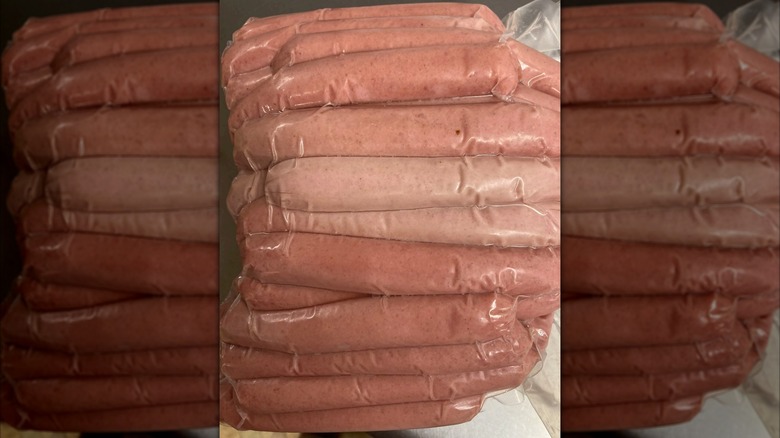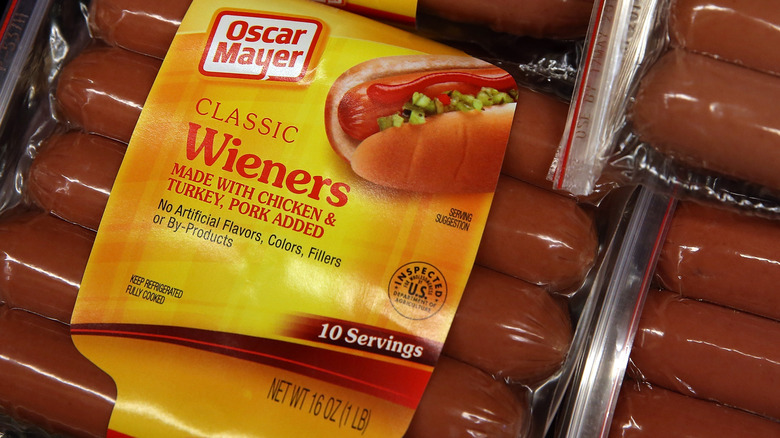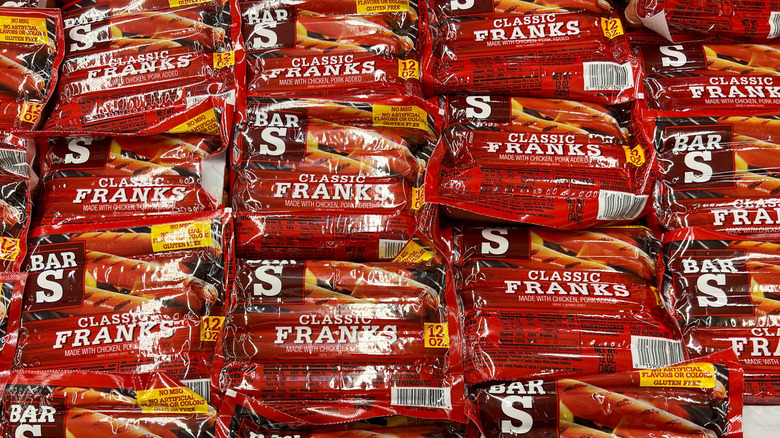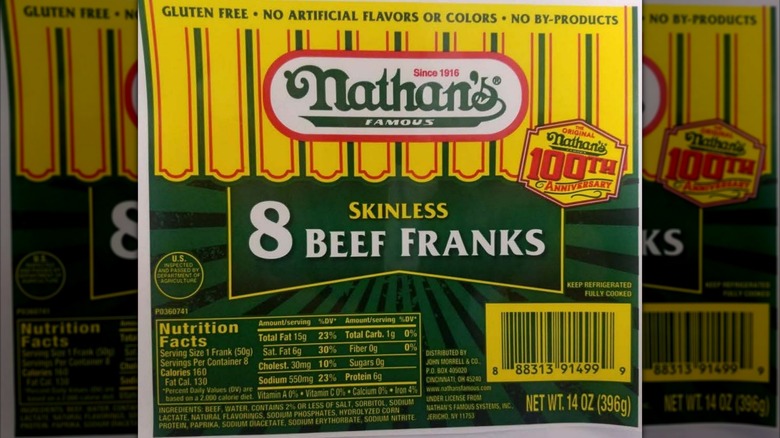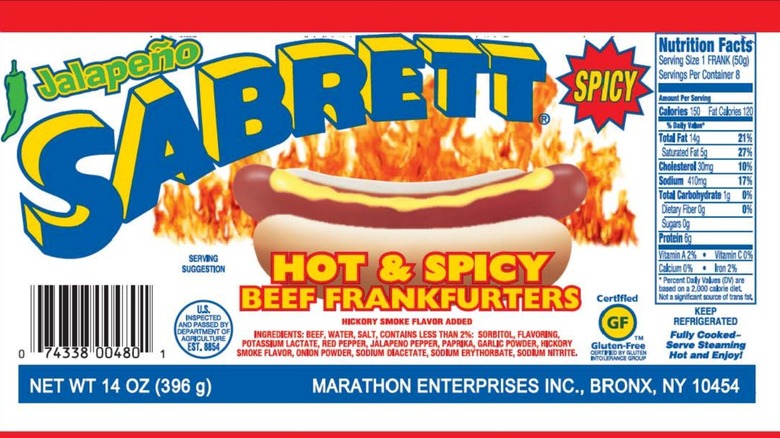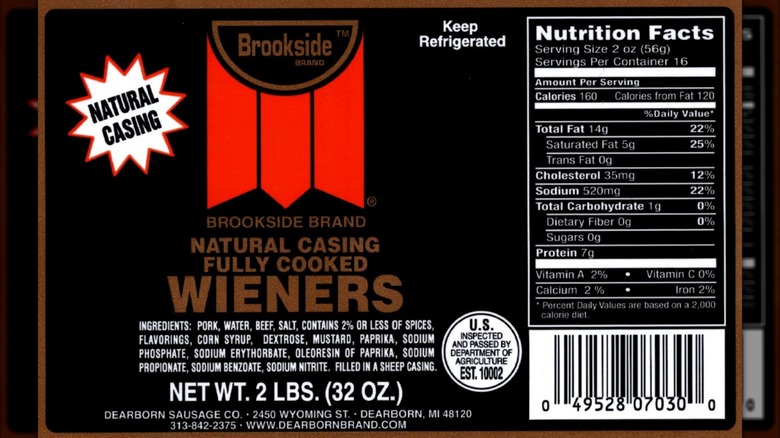11 Major Hot Dog Recalls Everyone Should Know About
Who doesn't love a hot dog? The all-American staple of ball games and county fairs, on a pure taste level the humble hot dog is one of the most reliable meat choices out there. You generally know exactly where you stand with these sausages, and although there are some pretty wild hot dog myths out there about where the meat comes from and what's inside them, you can usually rely on them to not make you seriously sick. However, that's unfortunately not always the case. Like all types of meat, hot dogs can be prone to contamination or mislabeling, which in the past has led to some massive recalls.
Hot dogs are a processed meat product, and their processed nature can mean that they're especially susceptible to bacterial contamination. Most of the time, bacteria like Listeria usually only contaminate the outer surface of meat products, but when they're processed this can move the bacteria to their very center. When you consider that hot dogs can be marketed as being safe to eat straight from the fridge (therefore skipping the heating step that might kill any harmful bacteria) this creates a seriously dangerous situation. The processing they undergo also increases the likelihood of contamination elsewhere, with metal and bone fragments occasionally causing large recalls. Plus, you have to rely on the food manufacturer placing these hot dogs into the correct packages — which seems to be harder than it looks.
1. Thousands of pounds of hot dogs escaped inspection in 2024, prompting a recall
Proper inspection of processed food products is crucial to ensure that they're leaving the factory in the best condition possible, and without any damage or contamination present. Unfortunately, this was a step that seemed to be missed in 2024, causing thousands of pounds of hot dogs to be recalled. Kentucky-based producer AW Farms had to retrieve several different hot dog products from restaurants and hotels in Ohio and West Virginia, once the Food Safety and Inspection Service (or FSIS) discovered that the dogs hadn't undergone federal inspection.
A lack of federal inspection doesn't necessarily mean that food products are going to be unsafe to eat, of course — but let's be real, it's something that food producers really should be participating in. Without adequate inspection of food items, as well as the conditions that they're produced in, the likelihood of contamination from bacteria or foreign objects, mislabeling and the omission of allergen information, and improperly-cooked food being shipped to suppliers is way higher. Bodies like the FSIS make it their mission to hold manufacturers to account and maintain rigorous standards so that your food gets to you safely and problem-free.
2. Almost 50 tons of Oscar Mayer wieners were recalled because of a labeling mix-up
Oscar Mayer is one of the most popular hot dog manufacturers out there. Sure, it may not be the fanciest dog you can buy, but what you see is what you get. Well, most of the time, anyway. This wasn't quite the case in 2014, when Kraft Foods, the company that owns the Oscar Mayer brand, had to recall almost 50 tons of its Classic Wieners. The reason they did so was because inside each pack wasn't Classic Wieners at all, with Oscar Mayer's Classic Cheese Dogs apparently making it into the packaging and being shipped out and sold.
Although this mislabeling issue was obviously a problem for customers who were expecting their dogs to taste the same as they always did, it extended a little further than that. The Classic Cheese Dogs contained milk, while the Classic Wieners did not. Therefore, they presented a serious safety issue for anybody who had a milk allergy or was lactose intolerant, as milk was nowhere to be seen on the label. Although nobody reported becoming ill from eating the mislabeled hot dogs, the issue was bad enough to justify a Class I notice being issued, signifying that the use of the product could result in grave health consequences or even death.
3. Over 100 tons of hot dogs were recalled for being undercooked
There are lots of ways you can use hot dogs, by grilling them, frying them in a pan, or threading spaghetti through them and boiling them for an all-in-one meal. The truth, though, is that you may not have to do any of these — some hot dogs may be perfectly fine to eat straight from the package. Part of the charm of hot dogs is that they're precooked, but this of course means you rely on the food company making them to fulfill their side of the bargain and, y'know, cook them in the factory. As folks discovered in 1994, you can't always trust them to do that, with a nationwide recall of Wilson and Corn King Jumbo Franks being announced because they were undercooked.
The issue was discovered by Wilson Foods Corp., who then reported the issue to the United States Agriculture Department. Although not all of the hot dogs produced from the recalled batch were undercooked, the company decided to track down everything it could to ensure the best safety for its customers. Unfortunately, this added up to a massive amount of product: 114 tons of hot dogs, to be precise.
4. A potential Listeria contamination caused Bar-S franks to be recalled
Listeriosis is one of the most common and most dangerous foodborne illnesses out there, with the U.S. Centers for Disease Control and Prevention estimating that it causes around 260 deaths a year in America. Listeria, the bacteria that causes listeriosis, has a nasty habit of getting into processed meat products. The threat reared its head once more in 2016, when Bar-S had to recall over 370,000 pounds of hot dog products due to the potential of Listeria contamination. Its chicken and pork franks, as well as several corn dog products, had to be recalled from all over the country.
This recall wasn't prompted by the discovery of Listeria bacteria in the hot dogs themselves, and nobody had become ill from eating them. Instead, it was issued following a host of recurring Listeria issues that the company was dealing with. Bar-S decided to proceed with caution and remove its products from circulation, no doubt at a significant cost to the firm. Good thing it did, though, as when Listeria outbreaks are bad, they're really bad. Just a few years later, South Africa would be caught in the grips of the biggest Listeriosis outbreak in history, with over 1,000 cases and 216 people eventually dying from the illness.
5. When metal pieces were found in Nathan's franks, they were recalled immediately
If you had to name what you didn't want to find when you bit into a hot dog, we'd guess that metal would be up there. Sadly, if you were eating Nathan's franks in 2017, you may well have ended up with just that. John Morrell and Company, the company that manufactured Nathan's franks, had to issue a massive recall of its beef hot dogs after three complaints of metal being found in them. The company also had to recall another of its hot dog products, its Curtis Beef Master Beef Franks, as it was concerned that metal had made its way into those as well.
It wasn't a small amount of hot dogs that it had to recall, either. Over 210,000 pounds of hot dogs were recalled in total from locations across the country. The saving grace was that nobody had injured themselves by eating the franks at the time of recall, a close call for the company. The recall was made even more embarrassing for John Morrell and Company as it had only started partnering with Nathan's Famous to produce its hot dogs a few years before. We doubt that the folks who started this iconic hot dog brand would have been happy with how its legacy was being handled.
6. Kent Quality Foods had to recall over 300,000 pounds of hot dogs due to misbranding and an undeclared allergen
Some of the biggest food recalls out there have been caused by fairly simple mistakes. This was proved in 2018 when Kent Quality Foods had to issue a recall of well over 300,000 pounds of its hot dogs and sausages because they were mislabeled. A massive range of its franks, wieners, smoked, and Polish sausages, sold under a variety of brand names, were sold without listing one key allergen on the label: Soy. This posed a significant risk to individuals who had soy allergies, and eating them could have resulted in serious health consequences.
Unfortunately, it seems that this recall was the result of a knock-on effect which points to the complexity of modern food processing. The company initially noticed the issue when it discovered that the spice mixture used in just one of its Beef Polish sausage products contained soy protein. This should have led to the recall of just this one item, right? Unfortunately, multiple other hot dog and sausage products were at risk of cross-contamination, causing Kent Quality Foods to recall them, too. As such, what could have been a small issue for the firm snowballed, and 44 individual products had to be tracked down.
7. Hot dogs containing bone fragments caused a massive recall
One of the joys of eating processed meat is that you usually don't have to worry about gristle or bones getting in the way of your dining experience. While this is normally true of hot dogs, it definitely wasn't the case in 2017, when bone fragments caused a gigantic recall of products. Marathon Enterprises had to recall a staggering 3,264 tons (almost 7.2 million pounds for those of you who like math conversions) of hot dogs, after customers reported that they found bone splinters in their food. Some customers also stated that they found bits of cartilage in the dogs.
Although one person had reported an injury from eating the contaminated hot dogs, it was pretty minor, and the main problem for the company was the enormous amount of product it had to deal with. The dogs, as well as some sausages, had been made from March to July, and Marathon Enterprises eventually discovered that faulty equipment may have led to the issue. This may well have occurred at the mechanical separation stage, where meat is forcibly removed from bone and cartilage by forcing it through a sieving device at high pressure to remove the hard tissue. Regardless, we're willing to bet that some people will be way more cautious when eating their hot dogs in the future.
8. Ball Park hot dogs were involved in an enormous Listeriosis outbreak and a big recall
Hot dogs and deli meats often go hand-in-hand for various reasons: They're both processed meats, they're both pretty salty, and they're both usually able to be eaten without being cooked. However, they also have one other reason they're similar, which is their ability to become contaminated with Listeria. This bacteria shows up again and again with hot dogs and deli meats, and in 1998 and 1999 it was behind a massive Listeriosis outbreak, which infected at least 50 people and was linked to the death of around 15 people.
The outbreak was traced back to manufacturer Bil Mar Foods, the company behind Ball Park hot dogs, after two packages of hot dogs made at the company's Michigan plant were found to have Listeria in them. Ball Park was far from the only brand that was involved in the recall, with franks and sausages from Bryan Bunsize and Grillmaster also needing to be recalled. Items sold under the Sara Lee, Hygrade, and Mr. Turkey brand names were also implicated and had to be tracked down. The outbreak eventually led to multiple lawsuits brought against Sara Lee by people who had eaten its products and became sick, and a misdemeanor charge that it pleaded guilty to.
9. Mislabeling and undeclared soy caused a Dearborn Sausage Company recall
Soy is in a lot of processed food and it can often make its way into processed meats (which just as a reminder, shouldn't be microwaved). Soy provides an emulsifying effect to processed meat and helps to bind lower-fat proteins together. However, while the food industry might love using it, the scores of people out there who have soy allergies are less keen. They're even less enthusiastic when food companies omit soy from their products' allergen lists. This happened again in 2024, when Dearborn Sausage Company mislabeled two of its ready-to-eat wiener products, leaving soy off the label.
As a result, Dearborn Sausage Company had to issue a recall for its products. The problem was caused by a mislabeling issue, with beef and pork wieners being labeled as beef wieners that contained soy, and its beef wieners getting the beef and pork label. As the beef wieners had soy in them, this meant that soy was missing from the label — but it also meant that folks who were buying beef wieners didn't know that pork was in the product. This could have presented a problem for Jewish or Muslim individuals who didn't eat pork on religious grounds.
10. The undeclared presence of milk caused a recall by Perdue Premium Meats
Milk can show up in the weirdest of places, and keen-eyed shoppers may occasionally notice it in meat products. Milk and milk proteins can improve flavor and texture, and give processed meats a certain smoothness. That may all sound pretty appealing, but people who have milk allergies are less keen on its presence in food — and what's even worse is when it sneaks into products without being on the label.
This happened in 2023, when Perdue Premium Meat Company, Inc. (which was doing business under the name Alexander & Hornung) accidentally sold Brookside beef wiener packages that contained a different product entirely. Apparently, smoked sausages had been placed in the beef wiener packs instead. The company only found this out when a customer complained that what they thought were wieners were something else entirely. Unfortunately, these smoked sausages had milk in them, which was undeclared on the beef wiener label. The silver lining was that the customer who had complained hadn't experienced an adverse health reaction to eating the mislabeled product, and nobody else reported one either. Still, it was a pretty close call.
11. Potential metal contamination prompted a Vienna Beef franks recall
Modern food manufacturing plants are a maze of metal, with virtually everything that the food passes through being constructed from the material. When that metal equipment starts to deteriorate, though, or when metal objects like scrapers or spatulas accidentally end up in food mixtures, then things can go really wrong — and metal can end up in your food. Metal contamination was the cause of a 2019 recall announced by Vienna Beef, with its beef frank links thought to contain metal pieces. The issue was serious enough for this recall to get Class I status, indicating a serious product contamination that could cause harm.
It's unclear exactly how the metal ended up in the company's franks, but it's pretty clear exactly how harmful it could have been if consumed. Metal fragments can present a choking risk, and if chewed or swallowed may result in cuts to the teeth, throat, or intestines. Food manufacturers can try to prevent metal contamination from getting to customers by implementing metal detection systems in their plants, but stainless steel can be particularly difficult to pick up — especially if the food that it's ended up in has a high salt content, as hot dogs frequently do. Luckily, no injuries occurred as a result of customers eating these franks.

